Postpartum care is of paramount importance in upholding your health and vitality as a new mother. How many postpartum moms do you know that have struggled with exhaustion, insomnia or postpartum depression and consequently been miserable during such a special time?
When I gave birth to my daughter at 22, I had NO IDEA it would be so hard. I struggled in complete exhaustion with a screaming colicky baby. It took me about a year to recover and I still have back pain that started after she was born.
In my case, as well as countless others, it was a live and learn scenario. In your case, it doesn’t have to be.
Read this article in its entirety and implement these recommendations for your postpartum care plan. You will be sure glad you did!
What Happens to Your Body After Birth
Birth is INTENSE! No matter how easy or difficult your experience is, birth still does a number on your body.
A large dose of Cortisol, the stress hormone, is released and can cause multiple disturbances in “the force”, including poor digestion, insomnia and even postpartum depression.
Bodily tissues become dehydrated from fluid loss during the birth and breastfeeding. Dehydrated tissues = guess what? CONSTIPATION! Not fun when you have such a tender bottom.
Digestion is also severely impaired, and can also contribute to constipation as well as the fearsome baby colic.
Do you have chicken lasagna ready-to-go in your freezer? Do yourself (and baby) a favor and save it for dad and the kids.
Mother Rebirthed
It is important to recognize that you have gone through your own rebirth and are just as delicate in body and mind as your baby. I can’t stress this concept enough.
In Ayurveda (the traditional medicine of India), the mother is considered to be at a major crossroad in her life. One path leads to deep physical and spiritual healing, that ends in the rebirth of a vital and balanced mother.
The other path leads down a road none of us want to go. In America, as in many Western cultures, we have lost wise-woman traditions that are rooted in thousands of years of experience.
In this postpartum care guide, I am offering simple concepts rooted in traditional Ayurvedic wisdom that have given mothers great results for millennia.
Simple Postpartum Care Strategies
Deep Rest
Follow baby’s example and SLEEP AS MUCH AS YOU CAN!
Sleep when baby sleeps. No medicine on Earth is better than deep rest.
Many common postpartum problems such as mastitis and heavy bleeding can be prevented by following this #1 rule. Plan on resting and nesting with your baby for the first 6 weeks, as much as possible.
Support System
In order to ensure that you are able to receive all the rest that you need, you are going to need a support system.
Forget about “not wanting to ask for help”, because in doing so, you are doing yourself (and baby) a great disservice.
Expand your support system past your partner to include family, friends and community. Your partner is also going to be exhausted and will be navigating their own part of the puzzle.
In order to keep stress levels low and love vibrations high you are going to need extra help with chores, cooking and childcare.
Make sure to communicate your boundaries and limit visits with you and baby to 15 minutes to ensure you are getting the rest that you need.
Hiring a postpartum doula is also a fantastic option. Postpartum Ayurvedic doulas (AyurDoulas) are doulas that have specialized training utilizing the wisdom in this guide.
Their in-home duties can include daily home consulting, postpartum abhyanga massage, infant massage, cooking delicious healing foods and herbal preparations. They are limited in number, but some are willing to travel.
Some also offer virtual consulting services and online programs as well.
Regular postpartum doulas are easier to find, and offer a more general form of support, including breastfeeding advice, running errands, babysitting and cooking.
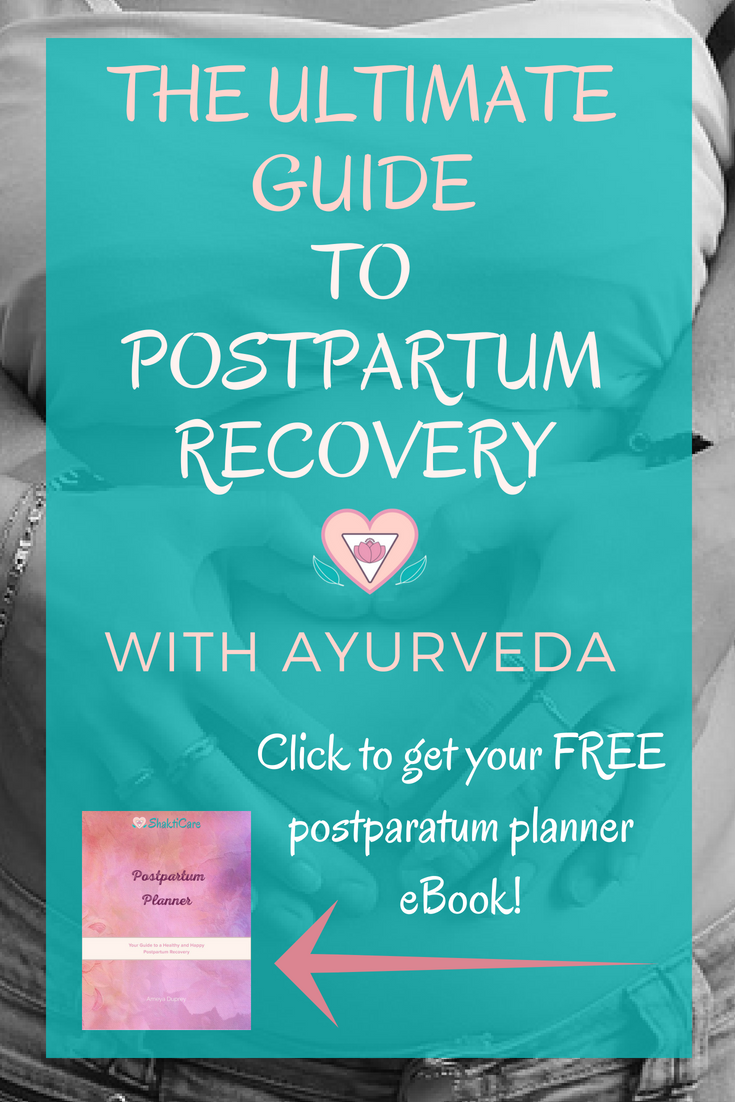
Warm Everything!
Every aspect of your postpartum reality should be warm. Your water, food, room, massage oil, bath and most of all – your heart! Birthing expels an incredible amount of energy and heat. Your digestive fire is extinguished and your body grows cold. It is necessary to reintroduce heat in various forms to get your internal fire reignited!
Hot water bottles are invaluable postpartum care tools every mother should have. They should be your new best friends (besides the baby!) for the next 6 weeks. Hot water bottles are grounding and help soothe postpartum pain, cramps and backache. I recommend using one over your lower abdomen and on your low back as much as possible for 6 weeks postpartum.
Oil Massage & Hot Bath
Incorporate warm oil massage followed by a hot bath into your daily self-care routine for some serious benefits!
Not only does it balance stress levels (balancing Cortisol) and provide deep relaxation, it stokes your digestive fire and nourishes your depleted tissues down to the cellular level! It is also considered the replacement for vigorous exercise, which is contraindicated during the postpartum period.
I recommend using organic unrefined sesame oil. It is deeply nourishing and penetrating, making it an ideal oil for you and baby postpartum. To achieve even greater rejuvenative benefit, use herbal sesame oil with ashwagandha and bala.
Belly Wrapping
Belly wrapping is an important self-care treatment to add to your daily routine.
After childbirth, it takes time for your displaced organs to regain their pre-pregnancy condition. Giving your belly a secure container will help everything settle back to shape easily, as well as give your kidneys a little extra love.
A piece of cotton cloth 10″w x 15′ long will do the trick.
Self Reflection
Prioritizing time to look within, is an important aspect of your postpartum care. So many big changes are happening during this time, it is easy to loose yourself in it all!
Daily meditation, yoga nidra, pranayama, or even reflecting in a daily journal, will help you maintain balance in your center.
Postpartum Care Nutrition
Digestion
Digestion postpartum is a big deal. Much more than most people realize. There is an art to building up the digestive fire after birth. You have to start out SUPER simple and use a lot of warming spices. Rice porridge is the food of choice for the first few days after birth.
Qualities of foods you want to focus on are:
- Always warm- never eat or drink anything straight out of the fridge!
- Soupy- Cook everything longer and with more water than you normally would.
- Oily- Ghee (clarified butter) and organic unrefined sesame oil are the best postpartum oils to eat with.
- Fresh- Foods that are over 6 hours old start to break down causing gas and baby colic(that includes frozen!).
- Sweet/Sour/Salty tastes- These tastes are nourishing to the body. Stay away from bitter, astringent and really spicy foods, as they have a cleansing action which is not recommended postpartum.
- Well cooked- Nothing raw except room temperature sweet fruits.
- Nothing fermented- Anything with a degenerative quality will not help your rejuvenation.
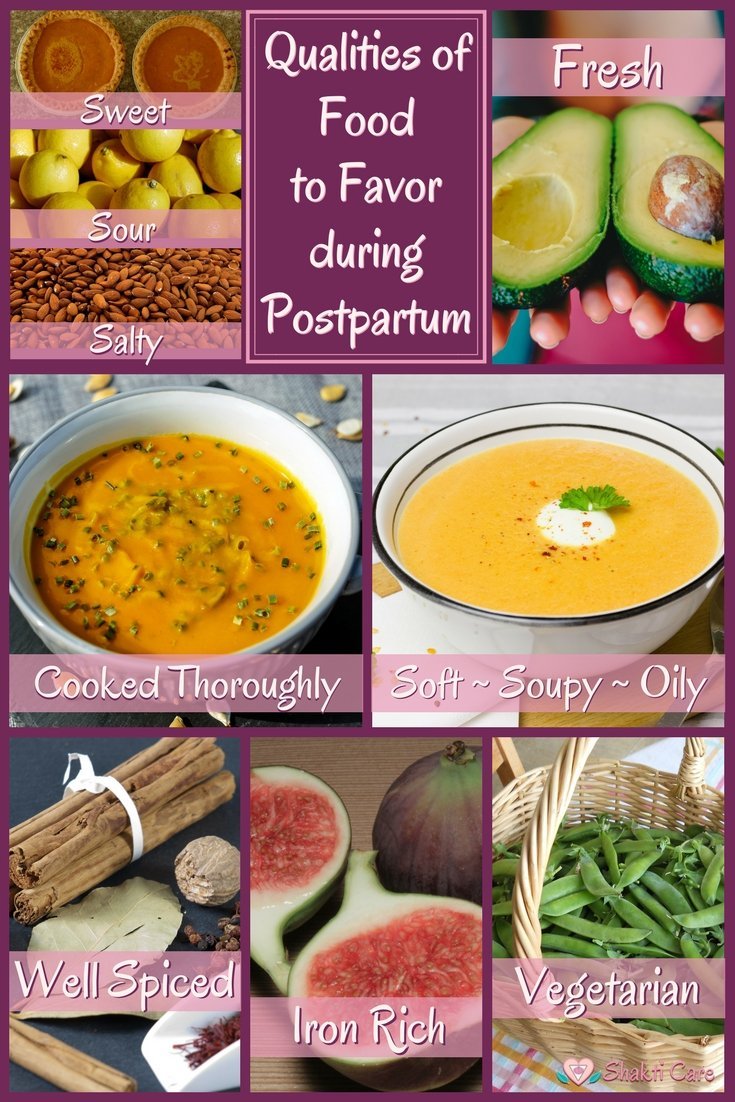
Food Combining
Different types of foods digest at different rates.
Fruits for example, digest in about 30 minutes, while grains digest in about 3 hours. Put those two together and guess what you get? Fermentation in the stomach which results in gas, bloating and toxic buildup.
Your digestion postpartum is a lot more sensitive than usual, so you need to be that much more careful. Poor postpartum digestions leads to baby colic, so you really want to do everything you can to avoid that!
Basic food combining rules
- Eat fruits by themselves- You can eat fruits with other fruits in most cases, except all melons should be eaten separate from all other foods. Allow 30 minutes digestion before eating other kinds of food.
- Drink (warm) milk by itself- Milk is a complete food and when used appropriately, is a powerful rejuvenative tonic. It doesn’t mix well with most other food types. It is very incompatible with salt and starch. Milk works OK with sweet things (that don’t contain salt and starch). *An important side note about milk – homogenized milk has been processed in a way that confuses even the healthiest digestion. The end result is actually toxic. Always get cream top milk and prepare it with spices. Check out my Mama’s Chai recipe to learn the basics of preparing milk properly.
- Wait 3 hours after a meal to eat more- This is the general amount of time it takes most food to digest. If it is really light and soupy, than maybe 2 hours.
Meat vs Vegetarian
Meat has a degenerative quality to it because it is…well….dead! So, that becomes a little tricky when you are going for optimum tissue revitalization. It also is heavy on the digestion. I recommend a vegetarian diet.
Where to you get your protein from, do you ask? Dairy (unless Vegan), dhals, pulses, beans and dark leafy greens.
There are ways to cook vegetable protein that are highly digestible and anti-gas, Kitchari being a great example. I consider kitchari the vegetarian’s chicken soup!
If you plan on eating meat postpartum, here are my recommendations for you:
- Stick with white meat and fish, such as chicken, turkey and cod.
- Always make them into a soup. First weeks postpartum, only use bone broth.
Healing Foods for Postpartum Care
Here are some examples of foods that have healing properties that will benefit your postpartum recovery.
- Proteins – Boiled milk, unfermented cheeses, lentils, soaked nuts, chicken, turkey and fish (used appropriately).
- Carbohydrates – Basmati rice, unleavened wheat , tapioca, oats.
- Fruit – Sweet, fresh, room temperature fruit and juices are great for their life force.
- Vegetables – Roots, squash, okra, fennel, spinach.
- Spices – Chai spices, garlic (browned in oil only), fennel, fenugreek.
Please understand that there is a proper timing on when to introduce different types of foods after birth based on digestive strength and food combination principles.
For best results, get your copy of Mama’s Menu postpartum cookbook or deep dive into Fully Healed Mama to regain your vitality after birth.
Postpartum Rejects
- Dry foods – dried fruit, crackers, rice cakes and potato chips
- Frozen foods and left-overs
- Chocolate, coffee, soda and alcohol
- Cold/raw foods – salads, sprouts and ice cream
- Fermented foods – leavened breads, vinegar, miso, tempeh, sauerkraut, soy sauce, pickles
- Spicy foods – chili peppers, jalapeño (small amounts of cayenne is OK)
- Cabbage family – Cabbage, cauliflower, broccoli, kale, mustard
- Nightshades – Eggplant, peppers, potato, tomato
- Mushrooms – Avoid fungus in general
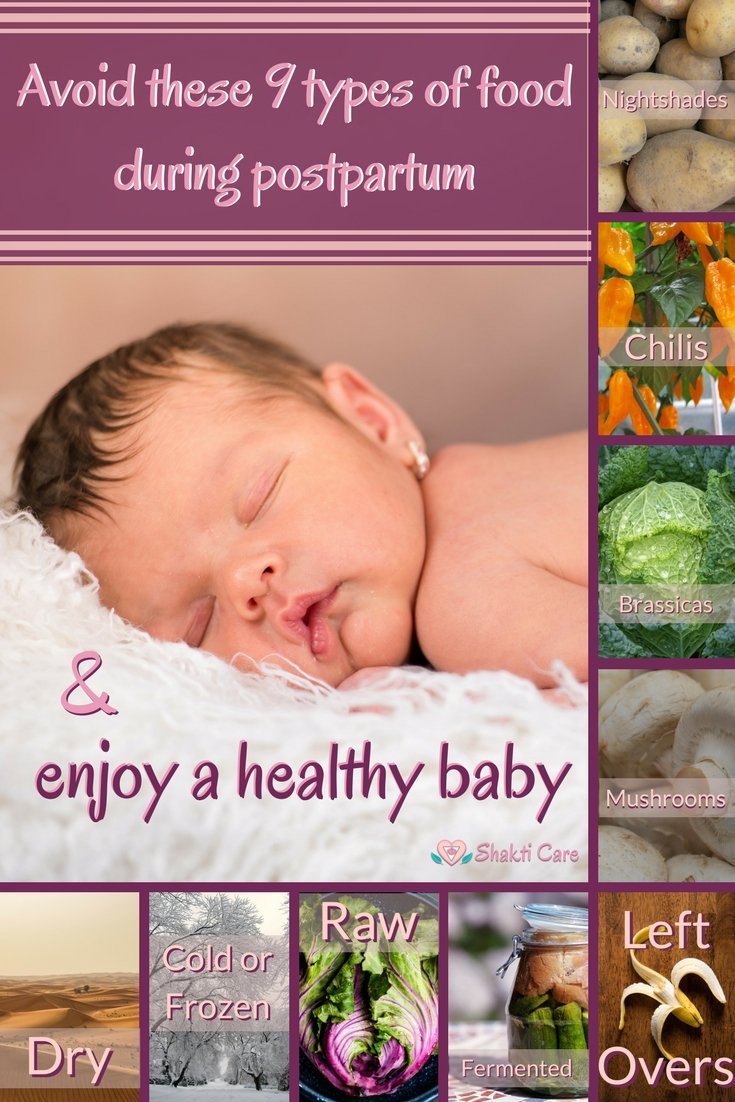
Foods & Spices That Promote Healthy Lactation
- Warm spiced milk with cinnamon, cardamom, saffron and/or clove.
- Soaked, peeled almonds (can be made into fresh almond milk)
- Minced garlic, browned in oil
- Ajwan, fennel, fenugreek, caraway, dill and basil
Utilizing this Ultimate Guide to Postpartum Care
Outlined in this guide are all the pearls of wisdom necessary to have a fantastic postpartum recovery. It is up to you to decide that your own postpartum well-being is a priority.
If baby has already arrived and you have just found this information, do your best to implement these recommendations as best you can. If baby hasn’t arrived, than you are in an ideal position to have the postpartum experience of your dreams.
Don’t be afraid to ask for the help that you need. Not only do you deserve it, it is quite literally your birthright.
If you would like to join the other mamas that have made a glorious recovery from birth with my Fully Healed Mama program, click here.
If you would like to learn more, register for my free masterclass on postpartum recovery here.



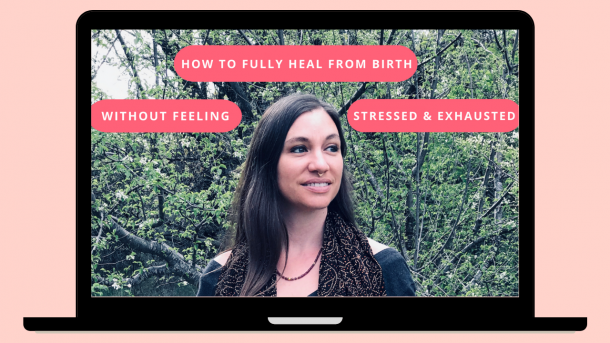
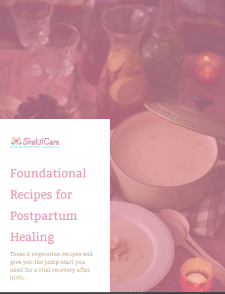
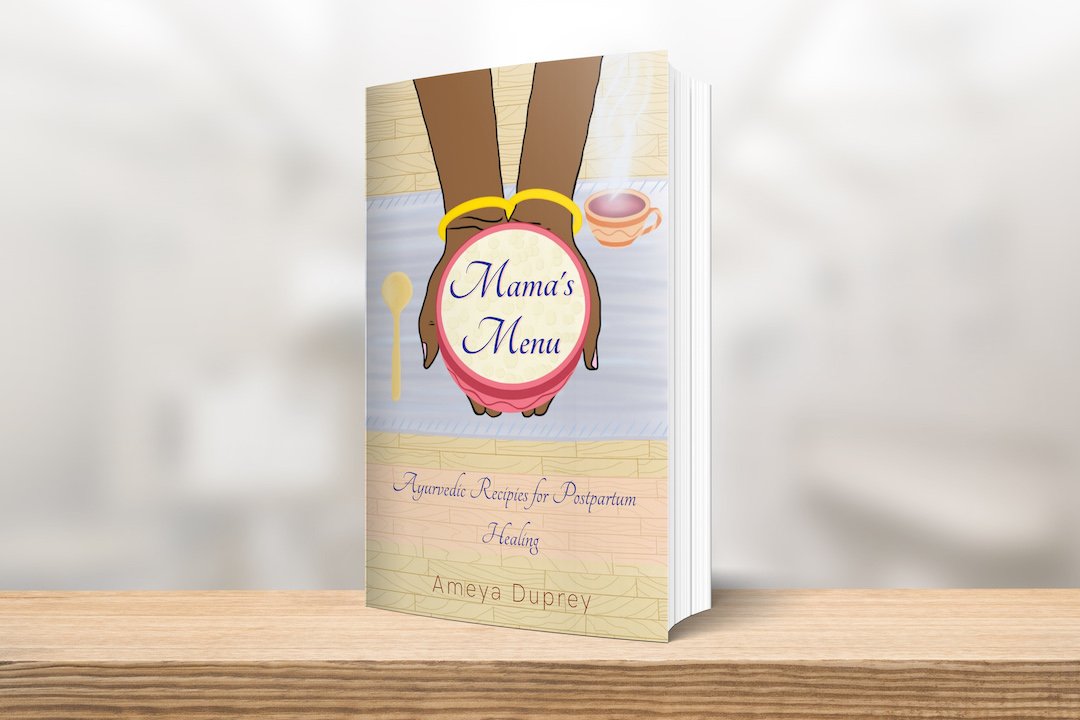
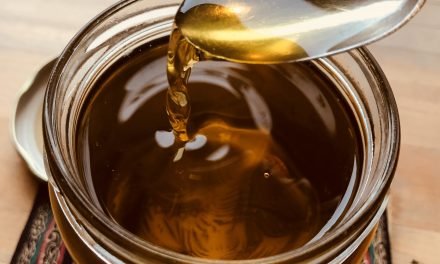



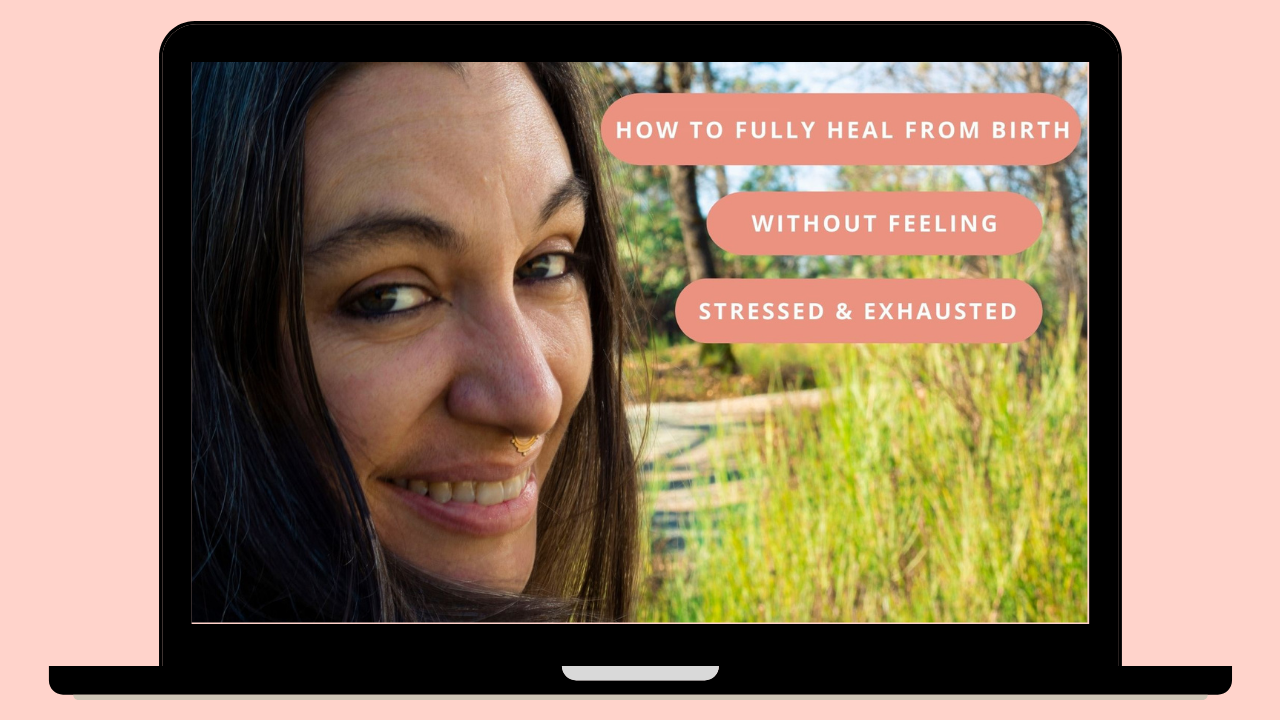




Hi
My baby is 2month old and still i have pain in my pelvic muscles…most of the time when i sleep at my side i face difficulty to turn other side..i can’t turn or wake up easily…
Hi Puja, so sorry to hear you are struggling! Are you in India? Did you receive any postpartum care? It sounds like you could use some solid postpartum rejuvenation. It’s not too late!
Make sure you get extra rest. If you are having trouble getting up, your body is telling you something.
Daily self-administered full body oil massage, with an emphasis on your pelvic area i’m sure will help. Check out my post
https://shakticare.com/mothers-massage/ to learn how. Use sesame oil or if you can get the Ayurvedic oil Mahanarayana or Ashwagandha/Bala that would be best. After the massage, take a nice hot bath or shower. After that, wrap your belly and hips with a long cloth about 15 feet long by 10 inches wide. Wrap in a criss-crossing motion that covers the whole hip as far up as your diaphragm. Do this every day and i am sure you will see positive results. Also, using a hot water bottle on your pelvic area when you are in bed will ease the pain.
Also, if you want to learn more about Pelvic Girdle Pain and some yoga and breathing exercises to try, read this post from Teeny Tiny Yoga http://teenytinyyoga.blogspot.com/2013/01/symphysis-pubis-dysfunction-or-pelvic.html.
I am available for consultations if you would like to work with me deeper.
Blessings on your healing Puja!
I am very passionate about postpartum care but one concern I have is making everything warm. It makes sense to me all the way up until you think about how inflamed you are around the perineum. I remember being freezing after giving birth last time, but still enjoying the relief an ice pack in my underwear brought. Also, frozen cabbage leaves to help with engorgement. I would love to learn a little more about this and any alternatives that might work. Thank you!
Hi Elyse,
From an Ayurvedic standpoint, all mothers have a pretty severe Vata imbalance after birth. Vata is by nature cold, changeable, dry, and rough; it rules pain and empty space. So,in general, we need to counteract these qualities with their opposites, to bring balance and healing. This I think you understand. So when it comes down to your inflamed lady parts…ice can have its place in the very short term, but i recommend using it sparingly. Ice is very cold and will increase vata, which means it can also increase pain. If you would like to use ice to reduce swelling, use an ice pack to soothe your inflamed bottom instead of a padcicle, which can be pretty intense. That way you can control how many layers of cloth are between the ice and your bottom. Anti-inflammatory herbs in a sitz bath are great, as is a bottom balm with anti-inflammatory herbs. I have personally found that Neem Ghee works wonders with hemorrhoids and virtually any surface inflammations. I hope this helps!
Hi
I gave birth 3 weeks before and it’s normal delivery. And the thing is I can feel something present in my birth canal when I touch while washing. It’s not outside. But it’s at the very starting point. I don’t know whether it’s cervix or what. I’m so much frightened. Will it take time to go inside? Is that normal? Please reply
I would suggest going to your doctor ASAP to have it checked out. From your description that doesn’t seem normal. Where are you located? Do you have access to medical care? The unknown can be the scariest part. Please go get checked out.